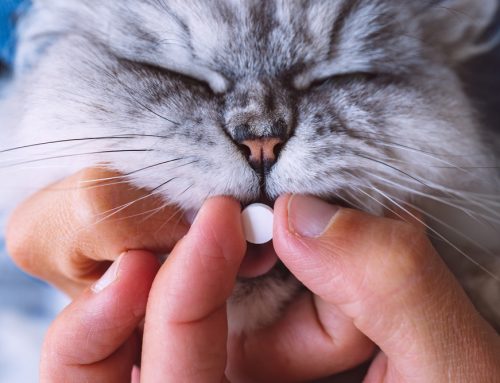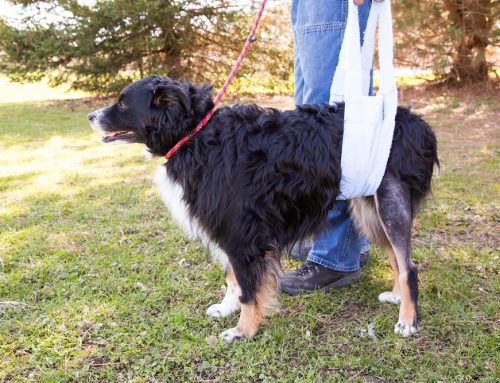Scarlett Siamese: My kingdom is falling apart! My humans painted a room, bought a bunch of new things, left me with the cat sitter, and then came back with a funny looking tiny human. I do not like the tiny human. He cries a lot, smells bad, and has taken over my mom’s lap. My humans keep forgetting to clean my litter box, so I have resorted to using the bedroom carpet out of desperation. I guess I will hide under the bed and refuse all nourishment, because I simply cannot deal with this mistreatment any longer.
Stress in cats
Poor Scarlett’s life has been turned upside down by the baby’s arrival, and she is extremely stressed, which is manifesting as inappropriate urination, lack of appetite, and withdrawal from human interaction. In a cat’s eyes, stress can be caused by anything that disrupts their routine—the arrival of new pets or people, moving houses, their owners leaving for a period of time, a family death, a schedule change, a home remodel, or a veterinary visit. Stressed cats tend to exhibit abnormal behaviours such as scratching furniture, fighting, overgrooming, or activity level changes, in addition to those Scarlett has shown.
SS: My humans were getting worried about me, so they took me to visit Alpine Animal Hospital. My favorite doctor gave me a clean bill of health, and talked to my dad about helping me be less stressed. Life has settled into a new normal, and the tiny human may be growing on me—but don’t tell my humans I said that.
Cat stress management
As with Scarlett, there are many ways to combat stress in our feline friends. If you think your cat is stressed, try some of these stress-relieving tools:
- Diffusers and sprays — Feliway Classic provides scent molecules that send a cat-specific calming message perfect for stressed cats, and Feliway Multicat provides a harmonious scent message that may help defuse stressful conflict between cats. These products are available on our online store.
- Environmental enrichment — Scratching surfaces, hiding areas, multi-level perches, and toys satisfy your cat’s natural desires, and can help alleviate stress and boredom. Teach your cat tricks, or play with them daily to keep their minds active. Ensure their litter box is clean, easily accessible, and located in a low-traffic, quiet area, and provide multiple locations, to prevent litter box guarding in multi-cat households.
- Foods, supplements, or medications — Ask our Alpine Veterinary Hospital team if calming foods, supplements, or prescription medications could benefit your cat, in addition to their environmental modifications.
Whenever your cat alters their behavior, especially if they are urinating inappropriately, or their appetite or activity level changes, you should first consult with our Alpine Animal Hospital team, to rule out medical concerns, like Scarlett’s owner. Then, if stress is deemed the culprit, ask our team for advice, or check out the Indoor Pet Initiative website for more details on implementing a stress reduction program for your kitty.
Frightened Frank
Frank Foxhound: One day I was minding my own business, when there was this huge boom, flashes of light, and then more and more booms. I was so scared that I leapt up and tried to hide under the bed to get away. The scary booms followed me, so I barked at them to stop, but they kept going. Every time it rains and the sky gets a little dark, my heart starts pounding, and I get nervous. I hate the scary booms! And, don’t make me think about fireworks—they are equally bad.
Fear and anxiety in dogs

Frank’s story is typical of a fearful, anxious dog. They experience an event that creates fear, and then become anxious whenever they think the situation is happening again. Fear and anxiety can stem from a variety of causes, including a loud noise, as in Frank’s case, previous mistreatment or abandonment, being trapped in a scary situation, going through multiple homes, or a lack of socialization to a particular person, place, or thing. Whatever the reason, the dog reacts by whining, barking, pacing, seeking attention, hiding, or destroying property, or becoming fear-aggressive in some cases. These reactions are stressful not only for the dog and owner, but can also pose an injury risk for all involved.
Fix your dog’s fear and anxiety
Some at-home solutions for fear and anxiety are available, including calming treats or food, compression garments, pheromone sprays, and environment modifications. Frank’s owners addressed his noise aversion using some of the techniques found in our July 2020 blog. However, for pets who do not respond to at-home solutions, do not underestimate the benefit of working with a veterinarian or veterinary behaviourist. These professionals can help develop, implement, and fine-tune a plan that specifically addresses your dog’s situation, using their wealth of knowledge about animal behavior, dog training, and behavior medications. The longer your pet’s fear and anxiety persist, the more difficult they are to address, and the more stress on you and your pet, so don’t delay in seeking help.
Whether your cat is literally ripping their hair out from stress, or your dog is a basketcase of fear and anxiety, our Alpine Animal Hospital team can come to the rescue. Contact us to make stress, fear, and anxiety a thing of the past for you and your pet.







Leave A Comment